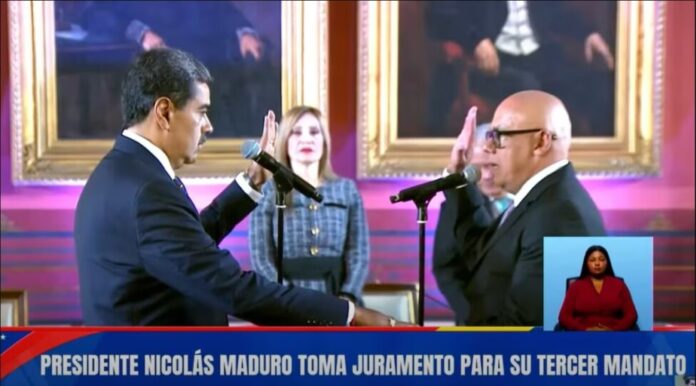A stolen election is consummated.

By IPS
HAVANA TIMES – Venezuela’s President Nicolas Maduro, in power since 2013, was sworn in for his third consecutive six-year term on Friday, January 10, amid widespread international disapproval and opposition accusations of attempting to carry out “a coup d’état.”
“I swear that this new presidential term will be one of peace, prosperity, equality, and a new democracy,” the 62-year-old leader pledged before the president of the legislative National Assembly, Jorge Rodríguez, and officials from other branches of government, all controlled by the ruling party.
The opposition, along with the governments of the United States, Canada, and many Latin American and European countries, insists that opposition leader Edmundo Gonzalez should have been inaugurated, as they consider him the winner of the July 28 presidential election last year.
The electoral body declared Maduro the winner with 53% of the vote compared to González’s 43%, although it did not disclose results from individual polling stations. Meanwhile, the opposition presented 85% of voting records showing that Gonzalez had won with 67% of the votes, against 30% for Maduro.
As Maduro took his oath, Canada, the United States, and the European Union announced new sanctions—mainly visa bans and financial transaction restrictions—targeting the civilian and military leadership governing Venezuela.
Washington offered rewards of $25 million for information leading to the capture and conviction of Maduro and Interior Minister Diosdado Cabello, $15 million for General Vladimir Padrino, the Minister of Defense, and also included Rafael Tellechea, head of the state oil company, in its sanctions.
The ceremony followed days of tension marked by intensified repression, including the arrest of opposition politicians and human rights activists. On the eve of Maduro’s swearing-in, thousands took to the streets once again to demand recognition of Gonzalez’s victory.
At a demonstration in Caracas, the main opposition leader, María Corina Machado, suddenly emerged from hiding. She was later violently intercepted and briefly detained by security forces but was reported to be free and safe shortly afterward.
Meanwhile, Gonzalez, who has been exiled in Spain since September, toured several countries in the Americas over the week, meeting with the presidents of Argentina, Uruguay, the United States, Panama, and the Dominican Republic.
Gonzalez had announced plans to return to Venezuela to claim his inauguration as the legitimate president. Several former regional presidents offered to accompany him, adding to the tension surrounding the Venezuelan political crisis.
In Caracas, amid panic buying of food and fuel by the population, the government deployed a strong police, military, and paramilitary presence in the city center. Maduro’s inauguration was moved forward by several hours, while activity in the capital remained subdued.
Maduro framed his swearing-in as a challenge to “imperialism and the international fascist right,” emphasizing the rejection of his inauguration by the United States, Canada, the European Union, and several Latin American governments, ranging from Argentina’s conservative administration to Chile’s leftist one.
He highlighted the attendance of representatives from more than 120 countries at the ceremony in the local capitol building, including Cuban President Miguel Diaz-Canel, Nicaraguan President Daniel Ortega, Antigua and Barbuda Prime Minister Gaston Browne, and officials from the parliaments of China and Russia.
Although Brazil, Colombia, and Mexico do not recognize the results of the July election, they sent their ambassadors to the inauguration ceremony.
Maduro announced plans to propose a constitutional reform to update the charter spearheaded by his mentor and predecessor, Hugo Chávez (1999–2013). The reform aims to build “a new society and implement necessary changes, including addressing new technologies, social media, and the chaos brought by trash culture.”
In his new term, he pledged to prioritize urban development, national security and defense, social welfare programs (focused on food, housing, and healthcare), and the empowerment of grassroots organizations.
He also promised to work towards “a greener Venezuela,” addressing environmental concerns over deforestation caused by mining and logging activities in the south, and to support multilateralism through organizations like BRICS (Brazil, Russia, India, China, and South Africa).
However, his speech did not address the exodus of approximately eight million Venezuelans—a significant portion of the country’s 28 million population—due to the political, economic, and humanitarian crises that have marked his tenure since 2013.
Opposition groups, unified under the Democratic Platform and represented by Gonzáaez, reiterated in a statement that Maduro’s inauguration completes the election theft and a coup d’état, plunging the country into “a new phase of struggle.”
In a new video message circulated on social media from hiding, Machado also accused Maduro of consolidating “a new coup d’état” by violating the Constitution and aligning with the dictators of Cuba and Nicaragua. “That says it all,” she declared.
“We all know that from today on, international pressure will intensify to make the regime understand that this is over. Edmundo [Gonzalez] will return to Venezuela to be sworn in as president when conditions are right. It is not advisable for him to enter the country today,” Machado concluded.
First published in Spanish by IPS and translated and posted in English by Havana Times.
Read more from Cuba and Nicaragua here on Havana Times.




